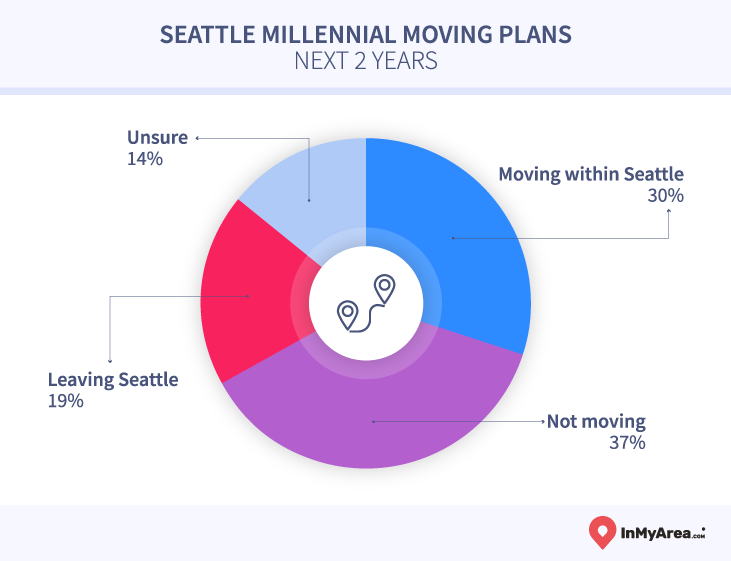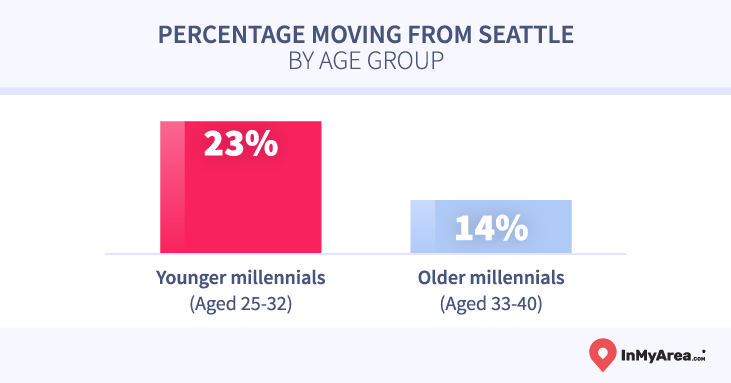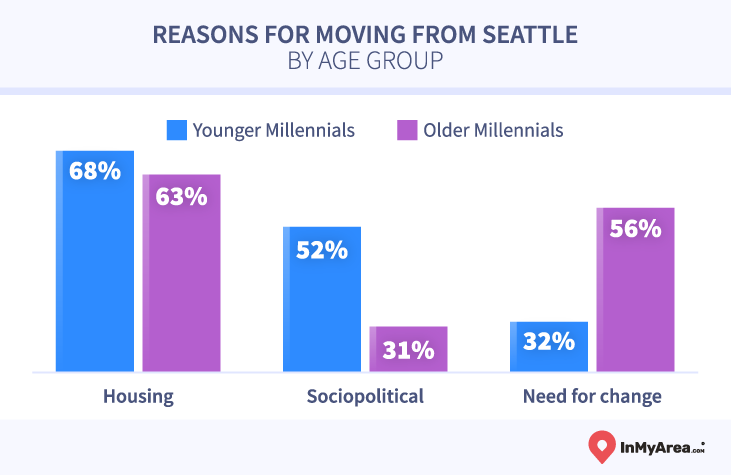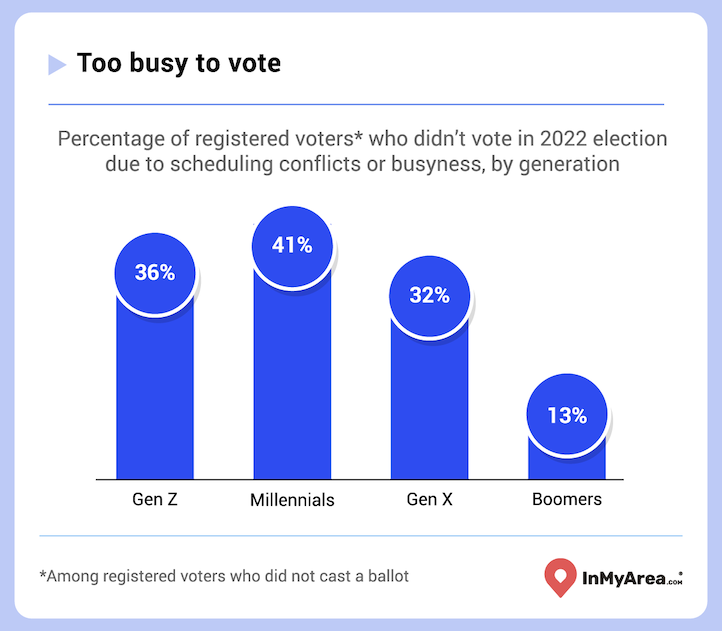Our recent nationwide survey assessing young Americans’ plans found that a reheating economy and expanded remote work will drive widespread relocation among untethered Millennials.
For a closer look at this anticipated trend, our research team turned its attention to individual cities. We decided to concentrate on prominent tech hubs, where overpriced, overcrowded conditions and online workforces make them ripe for a millennial exodus.
First stop: Seattle, where cutting-edge companies and traditional flannel endure torrents of coffee and rain.
Seattle's lush surroundings, grunge attitude, and Amazonian opportunities have long attracted young professionals.
How many are leaving, and why might they abandon the Emerald City? Our key findings included:
- Nearly 20 percent of millennials plan to leave Seattle in the next two years.
- Housing affordability is the primary reason cited for leaving the city, with the sociopolitical environment as a close second.
- Millennials who have lived in Seattle for at least four years are more likely to stay.
- Where are they going? Nearly a third are migrating to the South, following national trends.
Who’s Leaving Seattle?
As the economy rebounded and the pandemic finally subsided, we asked Seattle-area millennials (those born 1981-1996) about their anticipated living arrangements over the next two years.

Most millennials expect to remain in the Seattle area, but 19 percent have already decided to depart King County, with another 14 percent currently unsure about where they’ll live. That means as many as one in three millennials could soon depart.
We also discovered that the likelihood of leaving varied most noticeably by age and connection to the city.
Younger millennials (age 25-32) are considerably more likely to move away from Seattle in the next two years than older millennials (age 33-40), perhaps owing to deeper connections and expanded families keeping them in place.

Likewise, those newer to the city are leaving at a higher rate than those with longer tenure. More than a quarter of newer arrivals (three years or less in Seattle) expect to move away (27 percent). That number drops to 18 percent for those with 4-9 years in town, and shrinks further still (15 percent) for millennials who have been in Seattle for 10 or more years, who are most likely to have families, homes, and firmer roots in the community.
Duration of Seattle residence | Percentage moving within two years |
|---|---|
Less than 4 years | 27% |
Between 4-9 years | 18% |
10 years or more | 15% |
Why Are They Leaving?
To understand what might be driving millennials away, we asked those who were leaving to identify the most important reasons for their move.
Nearly 20 percent were departing for personal reasons unconnected to the city (citing education, family, romance, health, or work reassignment issues). However, motivations for the majority were revealing.
Reasons millennials choose to leave Seattle | Percentage citing reason as important in decision |
|---|---|
Housing issues | 66% |
Sociopolitical environment | 45% |
Change of pace/climate/scenery | 40% |
Unrelated personal reasons | 20% |
Find a better job | 16% |
Unsurprisingly, housing issues represented the primary reason most were exiting the city.
Seattle is the country’s 5th most expensive metropolitan area, driven by housing costs that ran more than double the national average even before a record spike this past year. Two-thirds of those choosing to leave sought cheaper accommodations, better housing for the money, or the ability to buy rather than rent.
Sociopolitical factors also weighed heavily in respondents’ choices. Seattle is a progressive city traditionally attractive to young idealists, but a turbulent 2020 may have discomforted millennials on both sides of the political fence. A year of heightened protests that included the temporary establishment of an “autonomous zone," likely deepened political divisions and left some younger residents feeling unsafe: 45 percent of those quitting the city indicated that crime levels and/or the political environment were prime motivators.
Despite Seattle’s beautiful setting, a restless 40 percent mentioned the basic need for a change of pace/climate/scenery (perhaps the famous rainfall was too gloomy). Only 16 percent were leaving in search of better jobs, attesting to the resilient employment market that continues to draw tech talent even as some millennials depart.
Examining these numbers by age, we find that housing issues motivated younger and older millennials equally, but that older millennials are more desirous of change, and the younger group was more turned off by current sociopolitical conditions.

Where Are They Going?
Media attention has focused on citizens (and tech companies) flowing southward to find better weather, fewer regulations, and less taxation, but that national trend isn’t broadly reflected by those millennials departing Seattle.

While nearly a third of respondents leaving Seattle plan to join the tide rolling southward, more than half aim to stay in the West, with a quarter remaining in Washington state. A smaller number will head to the northeast and midwest.
Motivations for moving appeared to have a limited impact on destination, whether millennials sought better housing, different sociopolitical situations, or just a life change. The one exception was employment – 56 percent of those hoping for a better job are heading to the south.
Conclusion
2020 let loose social/biological forces that limited the nation’s economic prospects and geographic mobility. Americans felt trapped —especially millennials, many of whom lived with their parents during the year.
Now that lockdowns have eased, businesses are booming, and remote work is more available than ever, many believe a pent-up migration will reshape the map with shifts away from tech hubs and cities.
We found as many as one in three millennials plan to leave Seattle shortly, driven largely by unaffordable housing, crime, politics, or just the desire for change made possible by new workplace norms. Most were planning to stay in the West, but a significant number are heading to the South.
It's unclear whether our results are indicative of long-term contraction for Seattle, since significant numbers of people continue to seek opportunity in the city. In fact, many of those leaving have only lived in Seattle for three years or less, so perhaps it's just a quickly revolving door.
Our data
Participants in this study were millennials living in Seattle, Washington. They ranged in age from 25-40. Because of the intensive nature of this study, our sample size was relatively small at 308 participants. Further research into this demographic would likely produce interesting results, and we encourage other researchers to study this population as well.
Related content:

